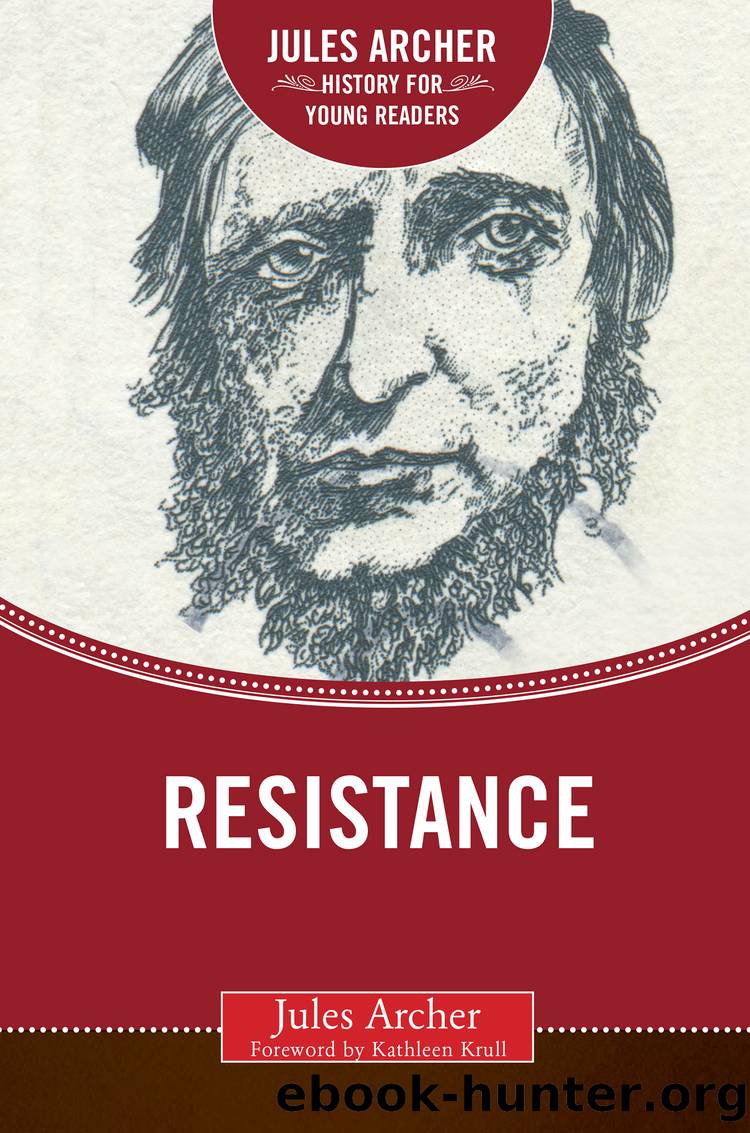Resistance by Jules Archer

Author:Jules Archer
Language: eng
Format: epub
Publisher: Sky Pony
Published: 2017-08-20T16:00:00+00:00
11
âStop the War!â
When President James Madison demanded a draft for the War of 1812, Daniel Webster thundered, âIs this, sir, consistent with the character of a free government? Is this civil liberty?â¦. Where is it written in the Constitution ⦠that you may take children from their parents ⦠and compel them to fight the battles of any war in which the folly or the wickedness of the government may engage it?â
Many thousands of Americans since have agreed with Webster and have gone to jail for their beliefs. In 1969, when Quaker Bob Eaton was sentenced to three years for resisting the draft, it was his sixth jail term for social protest. Speaking for the Committee for Nonviolent Action, he said, âWe feel we should go back to the old days when Friends werenât afraid to challenge the government and go to jail for their convictions. We believe in noncooperation with unjust laws.â
The anti-Vietnam Resistance began in 1964 with youths in the May Second Movement, who coined the slogan âHell, no, we wonât go.â But they, the Student Peace Union, the War Resisters League and the Quakers represented only a tiny minority of Americans. The vast majority believed in âstanding behind the Presidentâ in Johnsonâs decision to escalate the war.
Tried for draft resistance in 1965, nineteen-year-old Tommy Rodd told the court, âI am forced by my conscience to stand as representative of the suffering millions of Vietnam. I am forced to stand for the girl child burned to death in Bien Hoa, for the refugee cold and hungry in a camp on the outskirts of Saigon ⦠for the thousands with no legs, thousands more with no eyesâ¦. My word from them to this government, to this country is this: âStop this war!ââ
He was sentenced to four years in Federal prison.
Universities held mass âteach-insâ to protest the war. Yale Professor Staunton Lynd drew stormy applause when he told Berkeley students, âI am advocating nonviolent retirement of the present Administration, that is, the creation of civil disobedience so persistent and so massive that the Tuesday lunch club which runs this countryâJohnson, Rusk, McNamara, Bundyâwill forthwith resignâ¦. We must vote with our feet by marching and picketing; if necessary vote with our backsides by sitting in jailâ¦. Thoreau said that one man ready to die could stop slavery in America. I think all of us here this weekend should ⦠stand in front of the flamethrowers, and say: âIf blood must be spilt, let it be mine, and stop killing Vietnamese children. If you must search and destroy, let me save you the troubleâhere I am!ââ
The first antiwar march on Washington was organized by the Students for a Democratic Society (SDS) in April 1965. Over twenty thousand demonstrators picketed the White House, held a rally at the Washington Monument, then marched four abreast from the Mall to the Capitol singing âWe Shall Overcome.â
Recognizing that intellectuals were the backbone of the Resistance, President Johnson sought to cajole them into muting their opposition by putting on a âWhite House Festival of the Arts.
Download
This site does not store any files on its server. We only index and link to content provided by other sites. Please contact the content providers to delete copyright contents if any and email us, we'll remove relevant links or contents immediately.
Pale Blue Dot by Carl Sagan(5008)
Cracking the GRE Premium Edition with 6 Practice Tests, 2015 (Graduate School Test Preparation) by Princeton Review(4293)
Pocahontas by Joseph Bruchac(4259)
Unfiltered by Lily Collins(4004)
The Emotionary: A Dictionary of Words That Don't Exist for Feelings That Do by Eden Sher(3365)
The Daily Stoic by Holiday Ryan & Hanselman Stephen(3321)
The 48 laws of power by Robert Greene & Joost Elffers(3291)
Factfulness_Ten Reasons We're Wrong About the World_and Why Things Are Better Than You Think by Hans Rosling(3237)
The Innovators: How a Group of Hackers, Geniuses, and Geeks Created the Digital Revolution by Walter Isaacson(3208)
The President Has Been Shot!": The Assassination of John F. Kennedy by Swanson James L(3101)
Sapiens and Homo Deus by Yuval Noah Harari(3071)
Rogue Trader by Leeson Nick(3044)
Gettysburg by Iain C. Martin(2834)
The Rape Of Nanking by Iris Chang(2824)
Almost Adulting by Arden Rose(2709)
The Plant Paradox by Dr. Steven R. Gundry M.D(2620)
In the Woods by Tana French(2599)
500 Must-Know AP Microeconomics/Macroeconomics Questions(2572)
Make by Mike Westerfield(2321)
